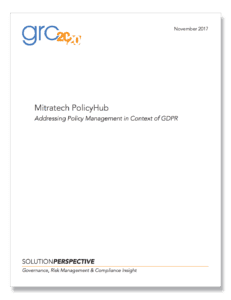 One of the biggest headaches for companies conducting business overseas still remains bribery and corruption. The grey area of what is deemed a fair gift, meal or payment against what might be constituted a bribe is a challenge keeping senior executives up at night.
One of the biggest headaches for companies conducting business overseas still remains bribery and corruption. The grey area of what is deemed a fair gift, meal or payment against what might be constituted a bribe is a challenge keeping senior executives up at night.
And with the screws continually being tightened on enforcement of anti-bribery laws, such as the UK Bribery Act and US Foreign Corrupt Practices Act, this problem looks set to bedevil the industry for years to come.
Corporations extending their global reach into remote locations face the gargantuan task of managing a complicated supply chain with a myriad of third parties that includes consultants, subcontractors, suppliers, brokers, and alliance partnerships.
Strategic responses from industry
The war waged against corruption has strengthened in recent years as governments around the world impose harsh laws to fight bribery in business dealings.
The multi-jurisdictional reach of anti-corruption laws means companies can now be prosecuted for acts of bribery committed anywhere in the world. And turning a blind eye to corruption is no protection against liability.
Protect yourself
The onus is on businesses to protect themselves from criminal prosecution. Corruption charges are not only a reputational issue. Conviction could lead to multi-million pound fines, as seen in recent cases such as Fresenius Medical Care AG & Co. – the German-based provider of medical products and services agreeing to pay $231 million to the SEC and Department of Justice in a global settlement to resolve violations of the FCPA in multiple countries over the course of nearly a decade, and Mobile TeleSystems PJSC – the Russian-based telecommunications provider agreeing to pay $850 million in a global settlement to resolve violations of the FCPA to win business in Uzbekistan.
How can you actively develop a culture that prevents any violations like this from occurring in the first place?
The role of Compliance Officer is demanding and multi-faceted. Part circus ring-master, part detective, they must juggle policy, procedure, regulation and compliance whilst demystifying complex supply chains and third party risk. Diplomacy and legal expertise are also requisite skills for managing the expectations of a board and demands of auditors and regulators. Implementing clear guidelines in place is a must.
Bribery and corruption Do’s and Don’ts
Do…
- Put in place a robust anti-bribery strategy and appoint a director to take responsibility for executing it.
- Ensure that your tough stance on bribery and compliance message is passed on to all employees and stakeholders, including suppliers and agents.
 Identify the main bribery risks faced by your business, document them in a risk register and make sure the board is in full knowledge of them.
Identify the main bribery risks faced by your business, document them in a risk register and make sure the board is in full knowledge of them.- Have knowledge of the companies you do business with – especially agents, suppliers and other third parties – ensure vigorous due diligence is conducted and keep up to date records on your findings.
- Regularly refresh your company’s policies on gifts, entertainment, hospitality, donations, and facilitation payments and ensure financial limitations are in place.
- Monitor your anti-bribery strategy to ensure it does not fall foul of anti-bribery legislation and report your findings to the board
Don’t…
- Assume the UK Bribery Act and other anti-corruption legislation is not relevant to you.
- Bury your head in the sand when concerns about bribery are raised by an employee or third party with whom you have business associations.
- Be afraid to walk away from a business contract if due diligence flags-up concerns about bribery or if you are not comfortable for whatever reason. Always record your findings.
- If you are forced to make facilitation or grease payments because you fear for personal safety, ensure these are recorded and notify the local UK embassy or consulate.
- Accept generous gifts and hospitality. If you do then record what you have received accept and consider donating them to charity.
Companies that have a reputation for zero tolerance of corruption enjoy a clear advantage and lessen reputational and financial risk. It is no longer possible to simply ignore a policy or procedure and hope it goes away or worse still, claim that it was not received in the first place.



